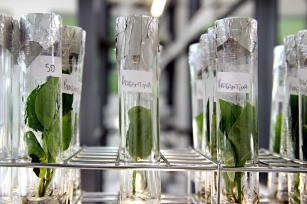Genetic Improvement of Black Pepper Aided by Cytogenetic and Advanced Biologic Techniques
Genetic Improvement of Black Pepper Aided by Cytogenetic and Advanced Biologic Techniques

Photo: Rosa, Ronaldo
Brazil is the fourth main world producer and exporter of black pepper, having had an estimated production of 33,000 tons in 2008. It is an important agricultural product to Pará's exporting schedules, being responsible for almost 90% of the entire country's production. The fusariosis disease caused by the Fusarium solani f. sp. Piperis fungus is the main cause for reduction of production cycles and increase in production costs. Once the disease is detected, the area is completely devastated in less than two years. It is estimated that more than 20 million plants have died as a result of this disease, reducing 10% of cultivated areas, which correspond to a loss of 5 million dollars a year. The commercial propagation way by vegetative propagation has favored the dissemination of the disease associated with genetic vulnerability. The battle against it by means of culture handling technologies has maintained the culture in economic viable levels, but the way to fight this problem will be by means of resistant/tolerant cultivares which are also productive. Other diseases that have power over the production are; the one caused by the Fusarium oxysporum fungus and the virus diseases caused by the Cytomegalovirus and Piper Yellow Mottle Virus (CMV and PYMoV). Currently, seven cultivares are recommended for cultivation, which differentiate themselves by their capacity to root cuttings, spike size, resistance to the Fusarium oxysporum fungi, fruiting period, precociousness, leaf shape, bud coloration, grain size and density, productivity. There is a lack of resistance sources within the species, however, there are Piper species which are native to the Amazon and which are resistant to the fusarioris disease at Oriental Amazon Embrapa's BAG. Thus, an alternative to the improvement of this species is the gene introgression of native species. There is interest manifested by producers in cultivares with great productivity, long spikes, resistance to the PYMoV, large grains and high density, good rooting of the cuttings, precocious cycles, and better adaptation to cultivating conditions. This project's aim is to create genetic variability to resist fusariosis by means of gene introgression of native plants into the cultivated plants; to produce intra-specific hybrids which are resistant to the PYMoV disease and other desirable agronomical traits; to develop cellular biology and molecular tools to support the genetic improvement program. Controlled inter and intra-specific cross-breeding will be performed; in vitro techniques will be applied in order to develop and/or adapt the micro-propagation process of cultivar cloning and production of disease-free seedlings, and cloning of selected genotypes; development of molecular markers of micro-satellite type specific to black pepper used in the study of genetic variability and genotyping; micrografting of native and cultivar Pipers; cytogenetic characterization of native and cultivar Piper species. A network or research will be formed with the participation of Oriental Amazon Embrapa, "Luiz de Queiroz" Superior School of Agriculture - ESALQ/USP(Piracicaba - SP), Federal University of Pará - UFPA (Bragança Campus - PA), and Federal University of Viçosa (Viçosa- MG), graduating and pos-graduating students of the involved institutions, partnerships with social organizations of producers in the selection of intra-specific hybrids. It will be a fundamental step in the quest to solve the black pepper fusariosis problem, in addition to the consolidation of a research group of advanced biology involved in the culture of blacl pepper. The impacts will be seen with the increase in the culture's production cycle and productivity, as a result of the new generated cultivares and the propagation of disease-free seedlings, contributing thus to a higher income and greater job opportunities, and less environmental damages by the reduction in the use of pesticides and other aggravations that come with deforestation.
/n
/n
Ecosystem: Amazonic
Status: Completed Start date: 04/2009 Conclusion date: 03/2013
Head Unit: Embrapa Eastern Amazon
Project leader: Oriel Filgueira de Lemos
Contact: oriel.lemos@embrapa.br
